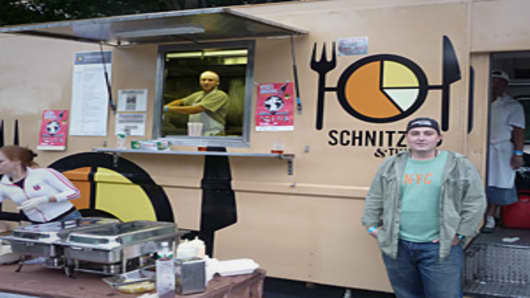When Oleg Voss got laid off from his job as an investment banker, he decided it was time for a career change.
So, he decided to pursue something he’d been talking about for a long time: Opening a street cart in New York City with longtime friend and chef, Jared Greenhouse.
(Video: Life as a Street-Cart Vendor)
“In January of ’09, I was affected by the global financial crisis,” Voss said of being laid off by Raiffeisen Investment, an M&A firm based in Vienna. “I was kind of in shock and needed to do something with my life.”
They decided to sell schnitzel — thin, breaded cutlets of chicken, pork or fish — on their cart, as Voss had become a big fan after living in Vienna for a year and realized that none of the New York City street vendors were serving it.
Voss said he makes about half the salary he made as an investment banker but he loves being an entrepreneur.
And the investment is paying off in other ways: Their “Schnitzel & Things” cart won the “Rookie of the Year” award at this year’s Vendy awards, which celebrate the best of New York’s street food. (Watch the interview with Voss.)
Signs of the recession were all around at the Vendys, which were held at the Queens Museum of Art, near the famous Unisphere, in Flushing, Queens.
Doug Quint decided to open “The Big Gay Ice Cream Truck” in Manhattan as a summer job to supplement his income as a bassoonist. (Watch the interview with Quint.)
And recent law grad Lev Ekster knew he had to come up with a Plan B when the firm he was working for last summer decided not to hire him full time. So, he started a dessert truck called, “The Cupcake Stop.”
“I graduated from New York Law School in May of this year and the legal job market just kind of kicked me out of the legal field. There weren’t any jobs available and I decided I wanted to work for myself — the rest is history,” Ekster said.
Ekster said despite the recession, store rents were still high, so he, like the Schnitzel guys, chose the street-cart route.
He said he’s always been a fan of sweets — and thought he could do better than the competition. Plus, the cupcake is the perfect mobile food: “You’ve got your BlackBerry in one hand, a cupcake in the other!” he quipped. (Watch the interview with Ekster.)
Street-cart vendors have always been an important part of everyday life in New York City but never more so than during the recession.
“It’s seen as an affordable way to get extremely high-quality food,” said Amy Kantrowitz, managing director of the Vendy Awards. “It’s one of the ways you can live affordably—and deliciously—in New York!”
Fares “Freddie” Zeidaies, a Palestinian who operates the “King of Falafel” cart in Astoria, Queens, said the recession has definitely been good for his business.
“You know, I used to see people going into the restaurants — I have a few restaurants across the street from me — now, they don’t stop over there, they stop by me,” Zeidaies said.
“They want to get that $6 plate instead of the $10 or $15 plate.” (Watch the interview with Zeidaies.)
“And, they’re big portions, too,” Zeidaies said. “For $6, you can get dinner — and maybe the next day’s lunch, too!”
Not to mention — you don’t have to worry about leaving a tip.
Zeidaies is always on the same corner — 30th Street and Broadway in Astoria — but many of the other vendors move around. In order to help their loyal followers find them, many of them are on Twitter.
Now that’s a tasty use of 140 characters!
Follow the Food:
@cupcakestop@biggayicecream
@schnitzeltruck
Questions? Comments? Write to ponyblog@cnbc.com.





